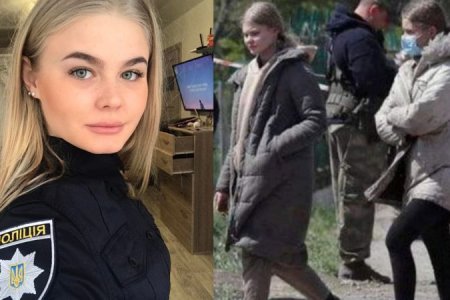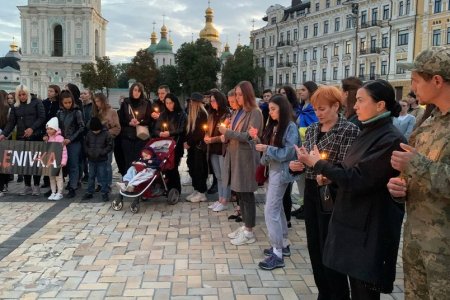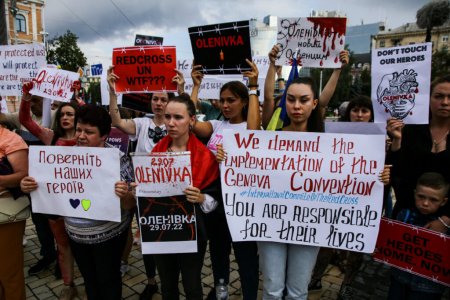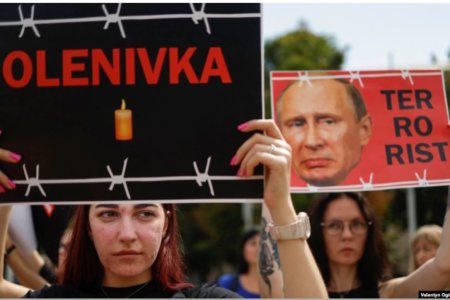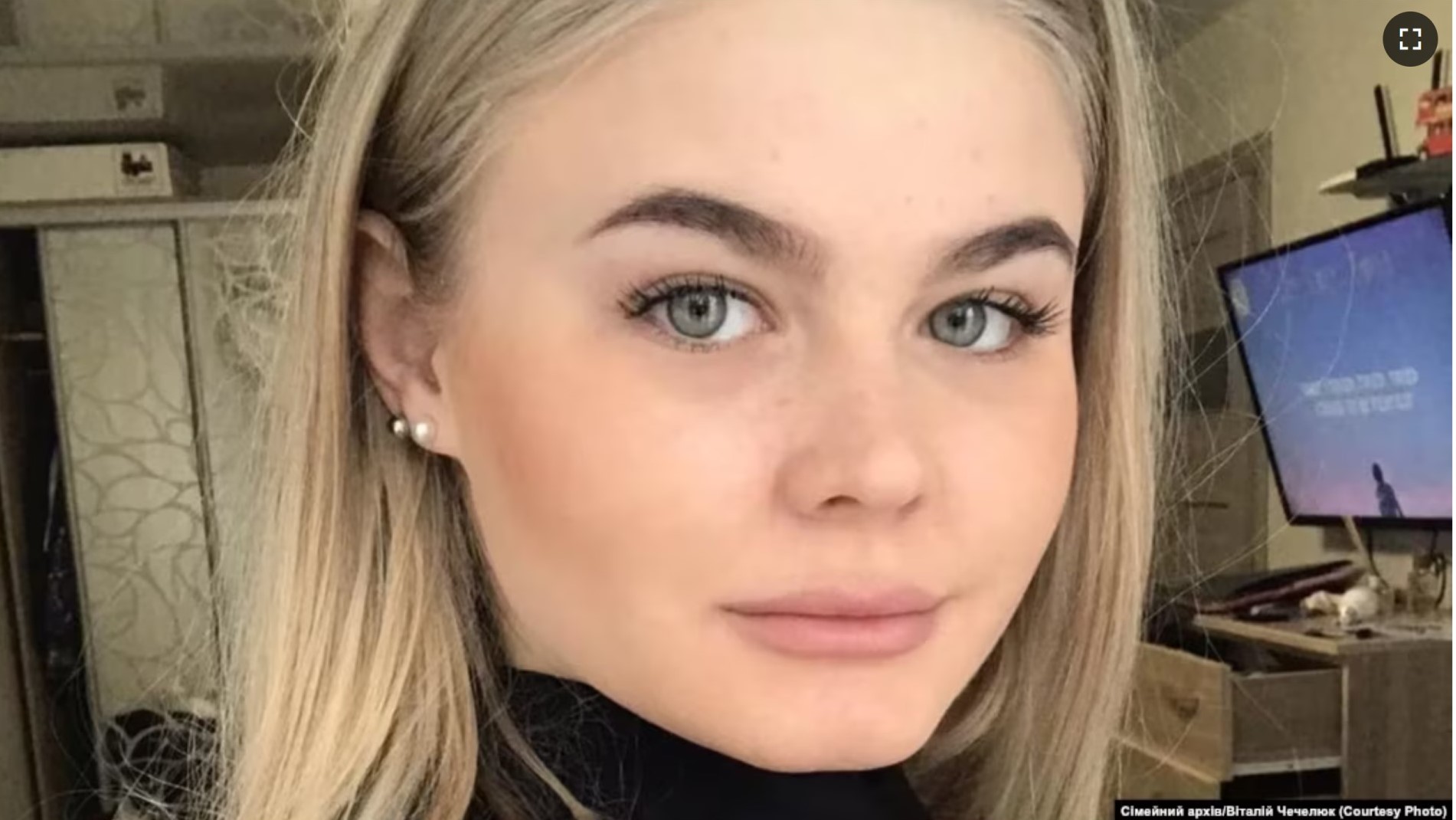
23-year-old Marianna Checheliuk should have been freed, together with her underage sister, back in May 2022, in an apparent agreement, negotiated by the UN and International Committee of the Red Cross (ICRC) on a humanitarian corridor from Mariupol to government-controlled Zaporizhzhia. Instead, she was seized by the Russians who have been holding her prisoner ever since, first in occupied Donetsk, then in Russia’s notorious Olenivka ‘concentration camp’ in occupied Donbas before being held in two different SIZO [remand prisons] in Russia.
Marianna has been allowed only one 30-second call to her family since May 2022, and the only information that Vitaliy and Natalia Checheliuk have about their daughter has come from other women prisoners whom Russia has finally released. The new information here is from interviews given by Natalia Checheliuk to the ZMINA Human Rights Centre and Vitaliy Checheliuk to Radio Svoboda.
According to one of the women, who was held with Marianna at the SIZO in Taganrog, the young woman’s state of health gives serious grounds for concern. As well as having lost a worrying amount of weight, she also complains of agonizing pain in the knees which the SIZO makes no attempt to examine or treat. Even painkillers are only handed out once a month when a doctor turns up at the SIZO. Natalia Checheliuk has also been told by other former hostages that the Russians add some kind of drug to the women’s food to prevent them from menstruating.
As well as the inhuman conditions that the women are held in, they are clearly subjected to direct acts of physical torture. Natalia Checheliuk knows of one woman whose nose was broken while imprisoned, and her daughter has been forced to spend the entire day ‘in swallow position’ [a typical form of torture], with punishment meted out if she tried to sit down.
Marianna’s family have learned that her cell is next to the room used for torturing prisoners, and every day they hear the groans and screams from prisoners of war and hostages being tortured.
As reported earlier, Marianna is a graduate from the Kharkiv Police Academy and was working in her native Mariupol as a police investigator when Russia began its full-scale invasion. This would not have made her a ‘prisoner of war’ as the Russians claimed even had she been working when seized, and not simply trying, with her parents and 15-year-old Alina, to survive Russia’s constant bombing and shelling of the city.
More importantly, if Russia seized her as ‘a prisoner of war’, they should have treated her properly, in accordance with international law and should not be refusing to release her.
It remains unclear why, since she is on the exchange list (meaning that Russia is not denying holding her), they do not free her and instead add psychological torment. Her parents have learned that Marianna has been taken out of the SIZO for a supposed exchange seven times. The Russians held her in a field for 40 minutes and then took her back to the SIZO, jeering and saying “see, your country doesn’t need you. You’re nothing, not needed by anybody.”
Marianna’s parents are seriously disillusioned by the behaviour of the UN and ICRC. They explain that the agreement had been that they would take civilians, including Marianna and Alina from Azovstal to safety in government controlled Zaporizhzhia. Instead, all of those evacuated from Azovstal were taken to a so-called ‘filtration camp’ in Bezymenne, in the Russian proxy ‘Donetsk people’s republic’ [DPR]. Natalia Checheliuk is outraged that the representatives of these bodies simply watched on while the Russian-controlled ‘DPR militants’ abducted people like her daughter. They didn’t even try to demand from the Russians that they keep their apparently given commitments, Natalia says bitterly. She also asserts that neither UN nor ICRC have tried to find out about her daughter’s fate.
Vitaliy Checheliuk says that they now know that Marianna was held in solitary confinement in a SIZO in occupied Donetsk for two months, before being taken to the camp in Olenivka, described by former prisoners as a concentration camp. She was taken there on 27 June 2022, and was held in a building near the block which was blown up on 29 July, killing over 50 Ukrainian prisoners of war. Soon after that Marianna was taken to Taganrog in Russia, then to another SIZO in Volgograd oblast, before being returned to the Taganrog SIZO on 30 December 2022.
Vitaliy explains that the one phone call that they have had from their daughter was on 7 August. He assumes that the Russians used Marianna’s concern about Alina as leverage, and, brutally, did not tell her that her sister was safe. That, in fact, was all that Marianna had time to ask during her 30-second call, and she burst into tears when her parents reassured her that Alina was with them. Then the phone went dead, and there has been no direct contact since.
Marianna was just 22 when the Russians took her prisoner. She turned 23 on 5 January 2023 in the appalling conditions of the Taganrog SIZO. Russia is holding a huge number of Ukrainian civilians hostage, often not even admitting that they are in Russian captivity. In Marianna’s case, they have used the fact that, up till 23 February 2022, she was a police investigator as excuse for calling her a ‘prisoner of war’, while still flagrantly violating all their commitments under international law on the treatment of such ‘POWs’.
As reported in December, it is quite clear that she and her family were among the huge number of civilians whom the Russians prevented from leaving Mariupol, while they continued to bomb and shell the city. The family’s apartment block in the city was destroyed on 30 March 2022, however they had been trying to find shelter in other places for some time, as their block did not have a basement to protect them from the Russian airstrikes. They had mainly sheltered, together with around 500 other civilians, in the basement of the House of Culture, which was close to the Azovstal Steelworks. The latter was the final bastion of Ukrainian defenders, and was also a shelter for over a thousand civilians.
After the first week of the invasion, the family’s food supplies and water ran out and they were forced to leave the relative safety of their bunker, despite the constant barrage of Russian bombs and shelling. There was a bakery near Azovstal with a still intact reservoir of water which residents were forced to try to reach. Vitaliy previously spoke of how his daughter had actively helped elderly residents with getting water and food. He also confirmed reports that the Russians particularly shelled this place, clearly targeting civilians who could not survive without water. He says that civilians were killed there each day.
It was on 25 March, during one of those Russian attacks, that the family became separated, with Mariana and Alina fleeing from the Russian shelling into the territory of Azovstal. The bunkers of the steelworks remained under the control of Ukrainian defenders until the middle of May, and it was they who enabled the girls to contact their parents and at least tell them they were alive. The invading forces knew very well that up to a thousand civilians, including children, had sought shelter at Azovstal, yet continued their savage bombing of the vast territory of the steelworks throughout April.
Vitaliy explains that the Russians kept sabotaging attempts to organize the evacuation of civilians. On 1 May, however, a humanitarian corridor was created, with both Mariana and Alina among hundreds of civilians who were allowed to leave the steelworks. The guarantee, however, that the civilians would be taken to Zaporizhzhia proved empty and they were taken to Bezymenne where the two sisters were separated. It is from Alina that we know that a person from Russia’s FSB [security service] had turned up and taken her sister away. In tears, Alina pleaded with him to leave Mariana alone, but he merely threatened the young girl that she would be thrown into a children’s home. Given Russia’s illegal deportation of a huge number of Ukrainian children, this was no empty threat, so when her parents received a call giving them 24 hours to pick up their younger daughter or she would be taken to a children’s home in Siberia, they risked their own lives and came for Alina. They left Mariupol shortly afterwards and have since been desperately trying to secure Marianna’s release.
